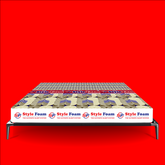Getting a good night’s sleep is not just about going to bed on time—it’s also about what you’re sleeping on. The matress you choose plays a crucial role in determining the quality of your rest. Whether you wake up refreshed or feeling stiff and groggy can depend entirely on your matress. This comprehensive guide will help you understand how to choose the right matress to improve your sleep, posture, and overall health.
Why the Right Matress Matters
Your matress directly impacts your sleep quality and spinal alignment. A poor-quality or worn-out matress can cause:
-
Back and joint pain
-
Sleep interruptions
-
Poor posture
-
Increased stress levels
-
Lack of focus and productivity
On the other hand, the right matress provides optimal support and comfort, helping you fall asleep faster, stay asleep longer, and wake up feeling rejuvenated.
Common Types of Matresses
Before buying, it's essential to understand the different types of matresses available. Each offers unique benefits depending on your body type, sleep habits, and preferences.
1. Memory Foam Matress
-
Benefits: Conforms to your body shape, excellent pressure relief, ideal for side sleepers.
-
Downsides: Can retain heat unless it includes cooling gel or ventilation.
2. Innerspring Matress
-
Benefits: Traditional feel, bouncy, great airflow for a cooler sleep.
-
Downsides: Less contouring, may not isolate motion well.
3. Hybrid Matress
-
Benefits: Combines foam and coils for support and comfort, suitable for most sleepers.
-
Downsides: Heavier and often pricier.
4. Latex Matress
-
Benefits: Naturally hypoallergenic, responsive, durable.
-
Downsides: Expensive and can feel too firm for some.
5. Orthopedic or Medicated Matress
-
Benefits: Designed for back pain and spinal alignment, often recommended by doctors.
-
Downsides: Can be firm and costly.
How to Choose the Right Matress for Your Needs
Finding the perfect matress depends on several personal factors. Here's what to consider:
1. Sleeping Position
-
Side Sleepers: Softer matresses (memory foam or hybrid) to cushion shoulders and hips.
-
Back Sleepers: Medium-firm matress to support natural spine curve.
-
Stomach Sleepers: Firmer matress to prevent sagging and misalignment.
2. Body Weight
-
Lightweight (under 60 kg): Softer matress for pressure relief.
-
Average weight (60–100 kg): Medium to medium-firm matress is ideal.
-
Heavier (over 100 kg): Firm or hybrid matresses offer better support and durability.
3. Pain Concerns
If you suffer from back, neck, or joint pain, a medicated or orthopedic matress may be best. Look for one that supports spinal alignment and reduces pressure points.
4. Material Sensitivity
People with allergies should choose hypoallergenic materials like natural latex or memory foam with antimicrobial properties.
Signs You Need a New Matress
Even the best matress has a lifespan. If you’re unsure whether it’s time for a new one, watch out for these signs:
-
Waking up with pain or stiffness
-
Noticeable sagging or lumps
-
Increased allergies or asthma symptoms
-
You sleep better in hotels or on other beds
-
The matress is over 7–10 years old
Tips to Test a Matress Before You Buy
Buying a matress is a significant investment. Here’s how to test it properly:
-
Lie in your usual sleeping position for at least 10–15 minutes.
-
Check the return policy or trial period. Many brands offer 30–100 nights of trial.
-
Test for motion transfer if you sleep with a partner.
-
Check edge support if you often sit or sleep near the edge.
Online vs. In-Store Matress Shopping
Online Shopping
-
Pros: Convenient, often cheaper, direct-to-door delivery, long trial periods.
-
Cons: You can’t test before buying.
In-Store Shopping
-
Pros: You can physically try the matress, ask expert questions.
-
Cons: Limited variety, possibly higher prices.
Pro tip: Read verified customer reviews and ratings whether buying online or in-store. This gives insight into real-life experiences and long-term satisfaction.
Budgeting for a Matress
Prices vary widely based on brand, size, and materials. On average:
-
Basic foam matress: $200–$500
-
Hybrid or latex matress: $800–$1,500
-
Luxury or orthopedic matress: $1,500–$3,000+
Remember, a good matress is an investment in your health and well-being. Spending a bit more for higher quality can save you money on future medical bills and missed productivity.
Final Thoughts: Upgrade Your Sleep Today
Upgrading your sleep starts with upgrading your matress. The right matress provides personalized support, enhances comfort, and improves sleep quality. By understanding your sleep habits, health needs, and matress options, you can make an informed decision that benefits you for years to come.
Take your time, do your research, and remember: better sleep = better life.












